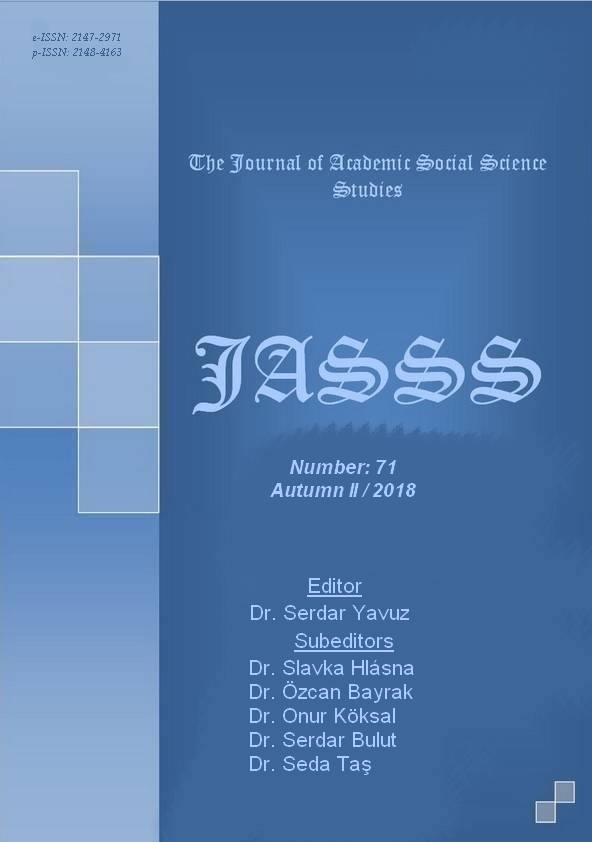Author :
Abstract
Bu araştırmanın amacı, ortaokul öğretmenlerinin görüşlerine göre Türkiye’de uygulanan afet eğitimini değerlendirmektir. Araştırmada betimsel tarama modeli ve anket tekniği kullanılmıştır. Araştırmanın evrenini, 2015-2016 eğitim-öğretim yılında Çanakkale ili merkez ilçesinde görev yapan 436 ortaokul öğretmeni ve örneklemini, 238 ortaokul öğretmeni oluşturmaktadır. Araştırma verileri, araştırmacılar tarafından geliştirilen anket formu ile toplanmıştır. Verilerin istatistiksel analizinde, SPSS istatistik programı kullanılarak frekans ve yüzde dağılımları ile çapraz tablo karşılaştırmaları yapılmıştır. Sonuç olarak, ortaokul öğretmenlerinin çoğunluğu afetler ile ilgili herhangi bir eğitim almamıştır. Ancak, öğretmenlerin yaşları ve çalışma yılları arttıkça afet eğitimi alma oranları artmaktadır. Ortaokul öğretmenlerinin çoğunluğu, evinde acil durum çantası bulundurmamakta ancak, evde acil durum çantası bulundurmayı gerekli görmektedir. Yine öğretmenlerin çoğunluğu, afetlere karşı bireysel hazırlıkların toplumsal hazırlığa dönüşeceğini ve afet sonrası zararları azaltacağını düşünmektedir. Öğretmenler, afet eğitimi içerisinde yer alması gereken en önemli üç konuyu, deprem, sel ve yangın olarak belirtmektedir. Ortaokul öğretmenlerinin çoğunluğu, Türkiye’de okullarda afet eğitiminin Afet ve Acil Durum Yönetimi Başkanlığı (AFAD) tarafından verilmesi gerektiğini belirtmektedir. Öğretmenler, afet eğitiminin öncelikle okul öncesinden başlaması ve ortaokul müfredatında “Sosyal Bilimler” dersi kapsamında verilmesi düşüncesindedir. Öğretmenler, afet eğitimi uygulamalarını programdaki yeri açısından yetersiz bulmaktadır. Öğretmenlerin çoğunluğuna göre, okuldaki afet eğitimi yöneticiler, öğretmenler ve öğrenciler tarafından yeterince ciddiye alınmamaktadır. Türkiye’de temel eğitim kurumlarında afet eğitimlerinin, okul öncesinden başlayan ve yüksek öğretim kademesine kadar devam eden süreçte, sistematik ve sürekli olarak profesyonel kişiler tarafından verilmesi önerilebilir. Bu eğitimlerin, afet risklerini önleme ve azaltma amacına yönelik olmasına önem verilmelidir.
Keywords
Abstract
The aim of this study was to evaluate disaster education applications in Turkey in terms of the views of secondary school teachers. Descriptive survey model and questionnaire technique were used in the study. The universe of the research is composed of 436 middle school teachers working in the central province of Çanakkale province in the academic year of 2015-2016. The sample of the research is composed of 238 middle school teachers. The data of the research were collected by the questionnaire developed by the researchers. In the statistical analysis of the data, frequency and percentage distributions and cross table comparisons were made using SPSS statistical program. As a result, the majority of secondary school teachers have not received any training on disasters. However, as the ages and seniorities of teachers increases, the rate of disaster education increases. The majority of secondary school teachers believe that it is necessary to keep an emergency bag at home but they do not have an emergency bag at home. Again, the majority of the teachers think that individual preparations against disasters will turn into social preparation and reduce the damage after disasters. Teachers describe the three most important issues that should be included in disaster education as earthquakes, floods, and fires. Secondary school teachers told that disaster education in Turkey should be provided by the Disaster and Emergency Management Department (AFAD). Teachers think that disaster education should be initiated primarily from the pre-school level and given to “Social Sciences” within the secondary school curriculum. Teachers find disaster education practices inadequate in terms of their place in the program. According to the majority of teachers, disaster education at school is not taken seriously by managers, teachers and students. It can be suggested that disaster education starting from preschool education and continuing up to higher education is given systematically and continuously by professional people in basic education institutions in Turkey. It should be emphasized that these trainings are aimed at preventing and reducing disaster risks.





